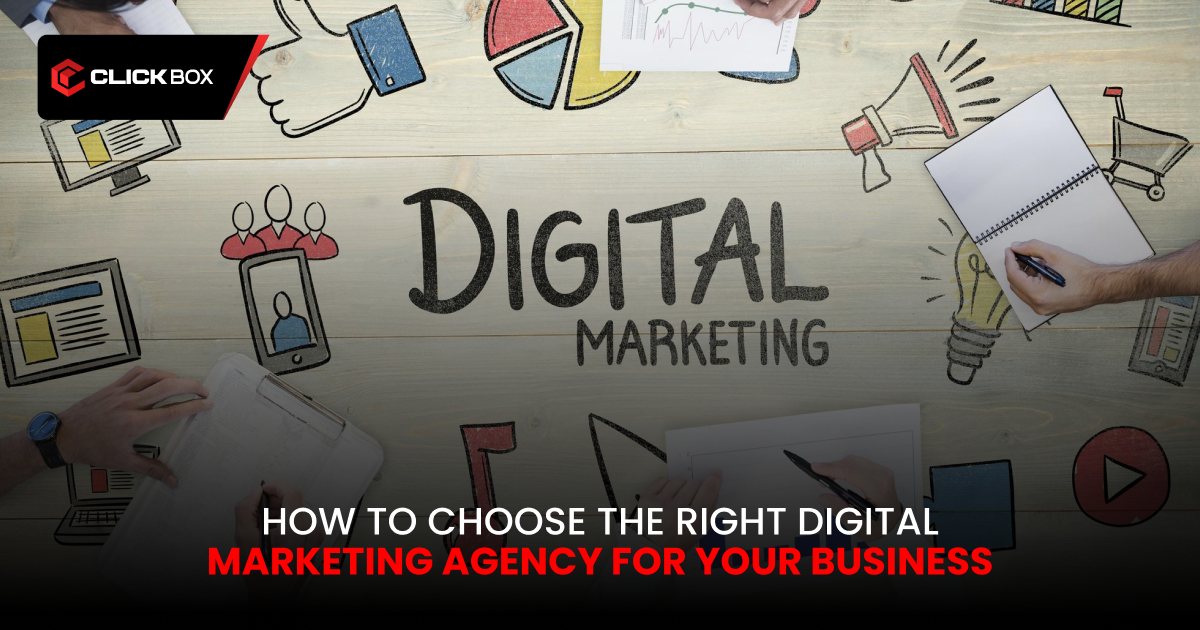How to Choose the Right Digital Marketing Agency for Your Business [2025 Guide]
Your business’s growth relies on more than just hard work and product quality. Picking the right digital marketing agency shapes how new leads find and trust your brand. The impact is real: the partner you choose will directly affect revenue, brand image, and long-term success.
The digital marketing world is full of agencies making big promises. Choosing one isn’t just about price or quick results. You need a partner who can show proven expertise, measurable outcomes, and clear communication. In this post, you'll get a step-by-step approach to selecting an agency that fits your business needs, saving you time, money, and stress.
As you read, you’ll find practical ways to assess credentials, understand service models, and verify past results. If you're ready to start your search, choosing the right digital marketing agency is critical. The insights here will help you make a confident, well-informed decision.
Clarify Your Business Needs and Goals
Defining your goals is the backbone of a successful digital marketing partnership. Before reaching out to a digital marketing agency, you need a clear sense of direction. This is not just for internal alignment—articulating precise business objectives allows you to explain your needs, evaluate agency proposals, and measure results without confusion. Common goals might include brand awareness, improved sales, or higher-quality leads. The stronger your internal clarity, the easier it is for an agency to shape strategies that work for you—and the better your final outcomes.

Identify the Most Important Marketing Services
Start with a list of the digital marketing services your business may need. Every business is unique. A restaurant might focus on local SEO and review management, while a SaaS startup could aim for content marketing and paid lead generation.
Some of the most common digital marketing services include
-
● Search Engine Optimization (SEO)
-
● Pay-Per-Click (PPC) advertising
-
● Social media management
-
● Email marketing
-
● Content strategy and writing
-
● Conversion rate optimization
-
● Website design and user experience
Reference recent client wins or pain points to guide your choices. If your sales pipeline is weak, prioritize lead generation services. If few people know your brand, focus on social media or SEO.
For examples of proven service mixes, see Digital Marketing Strategy for Small Businesses. This guide breaks down how various channels can support growth and highlights why the match between service and objective is so important.
When you define services up front, you communicate your needs more clearly and make it easier for a digital marketing agency to propose solutions tailored to your targets.
Set Realistic Budgets and Timelines
It’s important to match your project’s goals with your investment and time expectations. Start with your top priorities and dedicate a budget accordingly, making sure to factor in enough to reach a meaningful outcome.
Here are the steps for setting realistic marketing budgets and timelines:
-
● Audit current marketing costs and recent ROI.
-
● Rank priorities (e.g., lead generation, brand awareness).
-
● Allocate funds to the most important service areas.
-
● Set clear, trackable milestones—such as a 20% traffic boost in three months.
-
● Adjust based on feedback, data, or changing business conditions.
Most small to medium businesses invest between 7% and 12% of total revenue in marketing, but needs vary widely. Anchor your numbers based on real outcomes and historic spends, not wishful thinking.
Clear timelines help manage expectations for both you and the digital marketing agency. For more about aligning goals and outcomes, read about Digital Marketing Goals & Objectives, which highlights why setting milestones drives results.
By being transparent about your needs and real about your resources, you position yourself for a better partnership and more predictable growth.
Evaluate Potential Digital Marketing Agencies
Choosing a digital marketing agency is more than a quick decision—it’s a major commitment for your business. By comparing agencies methodically, you reduce the risk of choosing the wrong fit. Focusing on proven experience, communication, transparency, and clear pricing sets the groundwork for a strong relationship. Here’s how to evaluate digital marketing agencies so you can make an informed, confident choice.
Check Proven Experience and Industry Fit

When you review an agency’s case studies, client portfolio, and history, you set yourself up for success. Agencies with proven wins in your sector know what drives business results.
Practical steps to review experience and fit:
-
● Ask for recent case studies from your industry or a closely related one.
-
● Review their portfolio of ongoing and completed projects. Look for real metrics and before-and-after comparisons.
-
● Check for client references. Direct feedback on results is more trustworthy than polished testimonials.
If you run a professional services firm, reference guides such as digital marketing for professional services to see which industry tactics work best. For a recruitment or tech firm, specialized resources like digital marketing strategy for recruitment agencies or digital marketing strategies for IT companies can help match the agency’s skills to your field.
A good agency should be comfortable showing real examples—if they avoid specifics, that’s a red flag. For more evaluation tips and what to ask, see these key questions for assessing digital marketing agencies.
Assess Communication and Transparency
Strong communication builds trust and reduces missteps. A digital marketing agency should keep you updated and share both good and bad news as campaigns progress. Transparency in reporting prevents surprises and ensures you keep control.
What to look for in agency communication:
-
● Consistent updates via email, dashboards, or scheduled meetings.
-
● Honest, constructive feedback—even if results need improvement.
-
● A clear escalation process for questions or issues.
Try these tactics during your agency search:
-
● Track how long it takes to get a response during the sales process. Fast and clear answers show the agency values your time.
-
● Ask for a sample report or dashboard. Look for clear context, not just numbers.
-
● Request a basic outline of project milestones and who your main point of contact would be.
If an agency only discusses wins or hides behind jargon, caution is necessary. Regular, direct communication is crucial for effective partnerships. You can check discussions from other business owners on how they monitor agency communication at this Reddit marketing thread.
Review Pricing Models and Contracts
Understanding pricing—from monthly retainers to project-based fees or performance marketing—prevents unpleasant surprises down the road.
Common agency pricing models:
-
● Retainer: Regular fixed payments in exchange for a set of monthly services. Good for ongoing needs, but check for minimum contracts.
-
● Project-based: Pay for a specific campaign or project. Useful for clear, finite goals, but not always flexible.
-
● Performance-based: Costs determined by results, such as leads or conversions. Attractive if metrics are well-defined, but watch for limits or exceptions in the fine print.
Red flags to spot:
-
● Vague contracts with unclear deliverables.
-
● Hidden fees or unexpected add-ons outside normal project work.
-
● Inflexible long-term commitments with no exit clauses.
For a detailed look at how to evaluate marketing agency contracts, see the step-by-step guide at How To Evaluate A Digital Marketing Agency - Full Guide. Always read the contract closely and ask for explanations on anything unclear.
With these checks in mind, you’ll be better prepared to compare agencies side-by-side. For an expanded checklist, review Choosing the right digital marketing agency, which details additional factors to examine before you sign.
Ask the Right Questions Before Signing
A digital marketing agency is more than a vendor—it’s a business partner responsible for your brand’s reputation and growth. Making the right choice means gathering as much information as possible before making a commitment. This keeps expectations in check and helps you avoid future headaches. Before you sign, ask critical questions about reporting, metrics, support, and ongoing maintenance. Doing so reveals the agency's approach to transparency, problem-solving, and long-term accountability.
Understand Reporting and Success Metrics: Detail which metrics matter most and how agencies should report progress
Understanding the reports your agency provides is essential to tracking progress. A reliable digital marketing agency will set clear benchmarks and communicate results in simple terms. You should expect a reporting schedule and access to data that matters.
Here’s what to focus on:
-
● Frequency and Format: Ask when and how often you’ll receive reports. Will they come weekly, monthly, or after each campaign phase? Is the format a dashboard, PDF, or live link?
-
● Meaningful Metrics: Require explanations for metrics like:
-
● Website traffic sources
-
● Lead conversions
-
● Cost per acquisition (CPA)
-
● Return on ad spend (ROAS)
-
● Customer lifetime value (CLV)
-
● Social engagement rates
-
These metrics show if the agency is delivering value, not just generating numbers. Tools such as Google Analytics and CRM integration often support this insight. Learn more about the key indicators in 16 essential agency metrics to ramp up revenue and see which numbers most influence business decisions.
-
● Context and Next Steps: Good reports tell more than figures. They should highlight trends, explain successes, and outline action items for future improvement.
-
● Transparency: If results fall short, the agency must explain why, propose fixes, and update the plan.
For more questions about reporting and metrics, check out the internal guide, Top digital marketing questions answered.
Clarify Support, Troubleshooting, and Ongoing Maintenance: Explain what support should look like for clients after the campaign starts
After your campaign launches, support from your digital marketing agency doesn’t stop. Ongoing service is part of the deal, yet not all agencies treat it equally.
Ensure proactive service agreements by asking:
-
● Dedicated Contact: Find out who your main contact is for issues or updates. Know if you’ll have a project manager or direct access to specialists.
-
● Response Times: Ask how long it takes to get a reply to questions or issues. Will support be during business hours, or is there after-hours help?
-
● Issue Escalation: Check if there is a clear process for escalating technical issues, account disputes, or missed deadlines.
-
● Adjustments in Strategy: See how ongoing results impact your campaign. A quality agency will suggest timely tweaks if outcomes don’t meet goals.
Many businesses overlook support, only focusing on pre-launch or setup. Ask about troubleshooting steps, campaign optimizations, and regular advice. Digital Marketing Campaign Management gives more insight into campaign execution and the importance of reliable support throughout.
Quick Checklist: Questions to Ask Before Signing
A solid evaluation means getting the right answers up front. Use this checklist to avoid surprises:
-
● What metrics will you track, and how do they reflect my business goals?
-
● How often will I receive reports, and in what format?
-
● Who is my main point of contact?
-
● What’s your process for handling urgent issues or requests?
-
● How do you adapt campaigns if the first approach doesn’t deliver?
Explore deeper lists like 51 Questions to Ask Before Hiring a Digital Marketing Agency to cover all your bases with confidence.
When in doubt, never hesitate to double-check details. Protect your investment by making support and accountability part of the contract. Everyone wins when expectations are set from day one.
Conclusion
Selecting the right digital marketing agency shapes how your business will move forward. By setting clear goals, reviewing service fit, and checking communication standards, you reduce risk and build a framework for consistent growth. Look at contracts closely and know who will support you after the campaign starts—details matter.
A strong choice now sets up your business for better results and a stronger brand reputation. When you’re ready to act, use these guidelines to compare agencies against your needs. For even more insights into digital strategies that deliver results, review what a Top Social Media Marketing Agency in New Jersey can provide for diverse businesses.
Choosing with confidence gives you an edge. Thank you for reading—share your own tips or experiences below and help others make informed decisions.
John Click
Digital Marketer | SEO Copywriter | Content Strategist
Experienced digital marketer with a proven track record in creating compelling content that not only engages audiences but also drives conversions and enhances SEO visibility. My expertise extends beyond marketing strategy to crafting persuasive narratives that resonate with your target audience. I combine data-driven strategies with captivating writing to deliver measurable results, ensuring your brand shines in the digital landscape.
John Click
Digital Marketer | SEO Copywriter | Content Strategist
Experienced digital marketer with a proven track record in creating compelling content that not only engages audiences but also drives conversions and enhances SEO visibility. My expertise extends beyond marketing strategy to crafting persuasive narratives that resonate with your target audience. I combine data-driven strategies with captivating writing to deliver measurable results, ensuring your brand shines in the digital landscape.




 Digital Marketing
Digital Marketing


 Digital Marketing
Digital Marketing Digital Marketing
Digital Marketing



